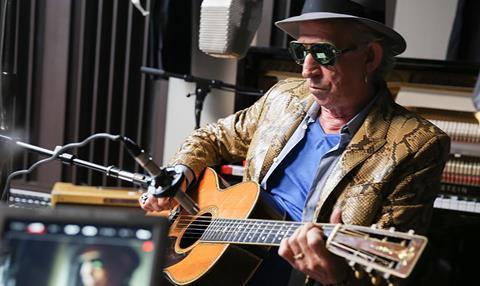Dir. Morgan Neville. US. 2015. 81mins

The title Keith Richards: Under The Influence may seem like a wry nod to the Rolling Stones guitarist’s infamous history with booze and drugs, but this likeable, lightweight documentary is actually more concerned with the man’s legacy in rock & roll, as well as the artists and genres that have inspired him. Hardly definitive, this wistful promotional item — Richards has a solo album, Crosseyed Heart, arriving Friday — paints the man as an adorable, rascally musical icon, and Richards is such a fun interviewee that there’s no point kvetching about the film’s superficial treatment.
Richards is such a fun interviewee that there’s no point kvetching about the film’s superficial treatment.
Set to premiere on Netflix after screening at the Toronto Film Festival, Under The Influence is a perfect fit for the small screen considering the documentary’s intimate scope. Directed by Morgan Neville, the Oscar-winner behind another music movie, Twenty Feet From Stardom, this portrait will play well with Stones fans and classic-rock lovers in general.
Running just over 80 minutes, Under The Influence spends time with Richards as he works on Crosseyed Heart, one of his rare solo albums in a half-century career. But it also follows him on a mini-tour of American cities that jump-started the Stones’ muse back in the early days, including Chicago and its rich blues catalogue and the legions of country music greats from Nashville. It’s not uncommon for rock documentaries to take a nostalgic look back at their subjects’ roots, but Under The Influence adopts a slightly different approach by focusing on Richards talking about heroes such as Hank Williams, Buddy Guy and Chuck Berry rather than offering a beat-by-beat personal biography.
Nevertheless, there’s no escaping the fact that Under The Influence is primarily a tie-in to advertise Richards’ new disc. Consequently, the documentary never digs very deeply, practically putting the guitarist-songwriter on a pedestal, although Richards has such a charmingly self-deprecating manner and talks about his idols with such reverence that Under The Influence escapes feeling like a vanity project.
As he did with Twenty Feet, Neville gives Under The Influence a breezy, slick polish, getting sit-down interviews with the likes of Richards’ long-time friend and collaborator Tom Waits. Offering archival footage of the Stones working on “Sympathy For The Devil” in the studio and of Richards bonding with reggae artists in Jamaica in the early 1970s, the film has the expected amount of fun goodies to whet the faithful’s appetite.
The reservation, of course, is that Under The Influence never escapes a certain infomercial quality, presenting bland, feel-good insights into Richards’ career and the Stones’ skill at merging diverse American styles into a distinctive, epochal sound. Under The Influence is perhaps most interesting when Richards reflects on touring America during the 1960s, witnessing how the black musicians he adored faced racism in their homeland, but the brief digression is merely a small irony in a documentary about the guitarist’s influences.
Thankfully, Richards is very enjoyable company. Shooting Richards in close-up to better illustrate the marvellous valleys and canyons of wrinkles that crisscross his face, Neville portrays the musician as an weathered icon, the years of touring and hard-living plainly, proudly visible. The filmmaker knows how to exploit Richards’ persona as a rock & roll survivor, and his subject (who wrote a memoir, Life, in 2010) is very happy to play the part. As for the filmed interludes of Richards performing tracks from Crosseyed Heart in the studio, it’s filled with the same modest, comfortable pleasures that are Under The Influence’s hallmark.
Director: Morgan Neville
Production companies: RadicalMedia, Tremolo Production
US distributor: Netflix, www.netflix.com
Producers: Morgan Neville, Justin Wilkes, Jane Rose, Sara Enright
Cinematography: Igor Martinovic
Editor: Joshua L. Pearson























